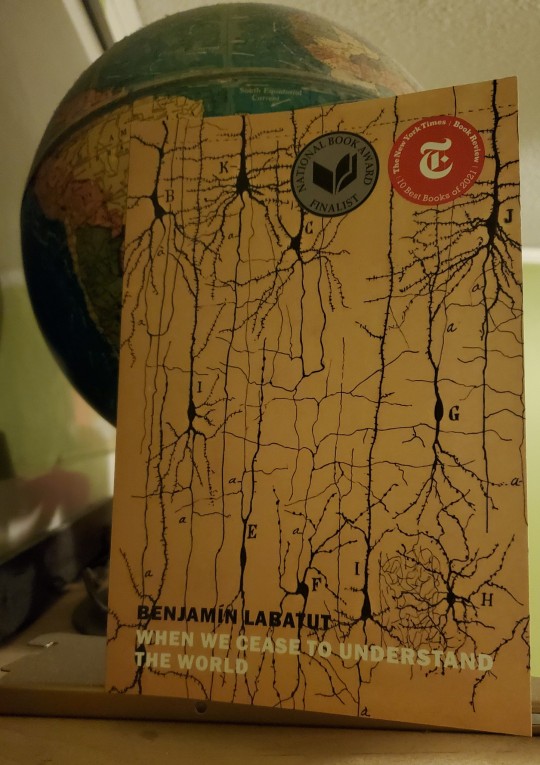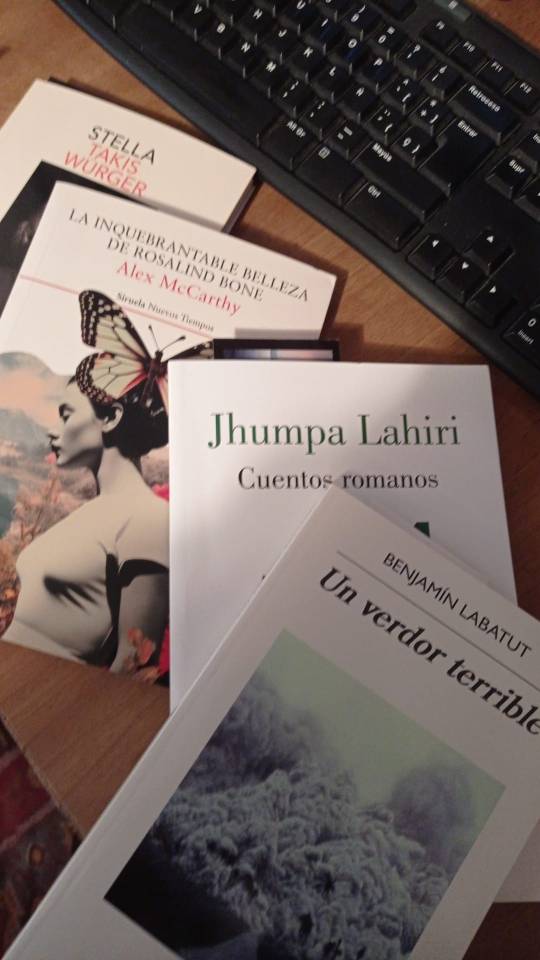#Benjamin labatut
Explore tagged Tumblr posts
Text
If you enjoyed either Oppenheimer or Benjamin Labatut's first novel When We Cease to Understand the World, you will love his new book MANIAC. This has been a public service announcement.
9 notes
·
View notes
Text


2/8/2024
30nym challenge Day 4: what book are you currently reading?
📚 - Un verdor terrible por Benjamín Labatut
#emgoesmed#studyblr#studyspo#med student#med school#med studyblr#productivity#30nym#days of productivity#un verdor terrible#when we cease to understand the world#benjamin labatut#cottagecore#cat#I love meeting cats on the street and saying hi to them#it brings me joy
301 notes
·
View notes
Text
The dangers of math
The fictionalized version of mathematician Gábor Szegő on his former student, John von Neumann:
"So I failed him, failed him miserably in what is most important: I was unable to communicate the sanctity, the holiness of our discipline. I did not teach him what the "pure" in "pure mathematics" really means. It is not what people think. It is not knowledge for its own sake. It is not a search for patterns, nor is it a series of abstract, intellectual games completely unconnected from the real world and its many troubles. It is something quite other. Mathematics is the closest we can come to the mind of Hashem. And so, it should be practiced with reverence, because it has true power, a power that can easily be used for evil, as it is born from a faculty that only we possess, and that the Lord, blessed be He, gave us instead of teeth, claw, or talons. but that is equally dangerous and lethal."
- THE MANIAC, Benjamín Labatut
#current reads#the maniac#benjamin labatut#von neumann#mathematics#math#physics#science#fiction#book quotes#literary fiction#book quote#bookblr#reading
2 notes
·
View notes
Text

Kids these days
10 notes
·
View notes
Text





Wind, Sand and Stars | Antoine de Saint-Exupéry
Lemon Bush, Bermuda | John Pfhal
Asking the Way | Ko Un; Translated by Suji Kwock Kim & Sunja Kim Kwock
Basket full of lemons | SOCH Outreach Foundation, Karachi, Pakistan
When We Cease to Understand the World | Benjamín Labatut
#i noticed a theme yesterday#wind sand and stars#ko un#when we cease to understand the world#benjamin labatut#karachi#john pfhal#text
11 notes
·
View notes
Text

Benjamin Labatut, Ο λίθος της τρέλας
Στον «Λίθο της τρέλας» ο Χιλιανός συγγραφέας του «Όταν παύουμε να καταλαβαίνουμε τον κόσμο» αποκαλύπτει την ορμητική παρουσία της τρέλας στη λογοτεχνία, τις τέχνες και τις επιστήμες αλλά και στον κόσμο που ζούμε σήμερα.
Στα τέλη του δέκατου πέμπτου αιώνα εμφανίζεται στην Ευρώπη μια σειρά από καλλιτεχνικά έργα Φλαμανδών και Ολλανδών κυρίως ζωγράφων, τα οποία έχουν ως κεντρικό θέμα την εκτομή του «λίθου της τρέλας»: πρόκειται για αναπαραστάσεις της αδιανόητης πρακτικής που δοκίμαζαν στον Μεσαίωνα για να θεραπεύσουν τους λεγόμενους «παράφρονες», ανοίγοντας το κρανίο τους και αφαιρώντας τον περίφημο «λίθο της τρέλας» που πίστευαν ότι βρισκό��αν στο πάνω μέρος του εγκεφάλου.
Επρόκειτο για μια πέτρα που έμοιαζε με τουλίπα και διακρίνεται εμφανώς σε έναν από τους πιο διάσημος πίνακες του Ιερώνυμου Μπος με τον τίτλο «Η θεραπεία της τρέλας» ή «Η εκτομή του λίθου της τρέλας». Εκεί σε πρώτο πλάνο βλέπουμε τον υποτιθέμενο ασθενή να έχει γείρει σοκαρισμένος στα χέρια του «γιατρού» που του ανοίγει το κρανίο υπό την εποπτεία μιας καλόγριας και ενός καλόγερου, οι οποίοι συμπράττουν σε αυτή την παρανοϊκή πράξη.
Σχολιάζοντας τον διάσημο πίνακα ο Μισέλ Φουκό στην Ιστορία της τρέλας (μτφρ. Πάρις Μπουρλάκης, Καλέντης), πολύ καίρια τόνιζε ότι κανείς σε αυτό το έργο, όπως ούτε και στην πραγματικότητα, δεν μπορεί να πει ξεκάθαρα ποιος είναι ο τρελός και ποιος ο συνετός, δείχνοντας στην πράξη ότι η επιστήμη πολλές φορές υιοθετεί πολύ πιο ανορθολογικές μεθόδους από την ίδια τη θρησκεία ή ότι, τέλος πάντων, τα όρια μεταξύ του ανορθολογισμού της επιστήμης και της θρησκείας είναι ενίοτε πολύ πιο στενά απ’ όσο θέλουμε να φανταζόμαστε.
Η αλληγορική δύναμη του έργου του Μπος αναφορικά με τα όρια της τρέλας, ειδικά όταν δεν επαρκούν οι εξηγήσεις, είναι τόσο δυνατή που μπορεί να πει πολλά για τη δική μας επισφαλή θέση σε έναν κόσμο όπου ο ορθολογισμός δείχνει να μην μπορεί να ανταποκριθεί ακόμα στην αποστολή του.

Καθώς, λοιπόν, οι ��αίμονες του ανορθολογισμού στοιχειώνουν τα πιο τρελά μας όνειρα, συγγραφείς όπως ο Λαμπατούτ μπορούν να στήνουν τη δική τους προνομιακή θέση επισκόπησης που στόχο δεν έχει να αναλύσει αλλά να αποκαλύψει και να μας δείξει, όπως έκανε κάποτε ο Μπένγιαμιν, τη στιγμή της συνειδησιακής επιφοίτησης η οποία μοιάζει με ενορασιακή πράξη και περισσότερο συλλαμβάνει παρά εξηγεί τη λειτουργία του κόσμου.
Καίριο ρόλο, άλλωστε, διαδραματίζει στο σημείο αυτό η βιωματική πράξη, η οποία ενέχει τόσο την προσωπική εμπειρία της θέσης μας σε ένα σύμπαν που δεν έπαψε ποτέ να διακρίνεται από το χάος και την τρέλα όσο και την αποκαλυψιακή δύναμη των δεδομένων που άλλους τους εξωθεί σε δημιουργικές στιγμές επιφοίτησης και άλλους στην αυτοκτονία (ή και στα δύο).
Αν, λοιπόν, ο Μπένγιαμιν χρειάστηκε να επικαλεστεί στις φιλοσοφικές του εξηγήσεις τον «Άγγελο της Ιστορίας» του Πολ Κλέε και τα ενορασιακά διδάγματα, καταφεύγοντας ακόμα και σε παραισθησιογόνες ουσίες, ένας άλλος κοσμοπολίτης Εβραίος, γεννημένος το 1980 στο Ρότερνταμ και μεγαλωμένος στη Χάγη, στο Μπουένος Άιρες και στη Λίμα, προτού εγκατασταθεί στη Χιλή, ο Μπενχαμίν Λαμπατούτ, προσέφυγε στο προαναφερθέν έργο του Ιερώνυμου Μπος ή στις οριακές στιγμές της έμπνευσης του Χ.Φ. Λάβκραφτ και του Φίλιπ Κ. Ντικ για να διαρθρώσει τον δικό του θεωρητικό αντίλογο για έναν κόσμο που διαρκώς γλιστρά από τα ορθολογικά εργαλεία και μας ξεφεύγει.
Ακόμα και αν τα φιλοσοφικά μεγέθη δεν είναι ίδια, και το φιλοσοφικό σύστημα του Μπένγιαμιν δεν συγκρίνεται με αυτή του νεαρού Χιλιανού, ωστόσο πρόκειται για μια αντίστοιχα καινοφανή, άκρως πρωτότυπη και διεπιστημονικά ενδιαφέρουσα απόπειρα να ξαναδεί τον κόσμο ποιητικά και φιλοσοφικά με άλλα μάτια μέσα από τη δύναμη της περιπλάνησης και την ανάγκη περιδιάβασης του ενδιάμεσου πεδίου ανάμεσα στις τέχνες και τις επιστήμες.
Σε αντιστοιχία με το προηγούμενο βιβλίο του, που έχει μεταφραστεί ήδη σε είκοσι γλώσσες με τον τίτλο «Όταν παύουμε να καταλαβαίνουμε τον κόσμο» (μτφρ. Αγγελική Βασιλάκου, Δώμα), όπου παρατηρούσε, ξεκινώντας από την άμεση συνάφεια του κυανού που χρησιμοποιούσαν οι ζωγράφοι με την απόχρωση που είχε το δηλητηριώδες αέριο που εξόντωσε τους Εβραίους στα στρατόπεδα συγκέντρωσης, τα σχετικά όρια μεταξύ της παράνοιας των επιστημονικών ανακαλύψεων και της απερινόητης έμπνευσης των καλλιτεχνών, ο Λαμπατούτ σε αυτό το τομίδιο με τον τίτλο «Ο λίθος της τρέλας» μιλάει ξεκάθαρα για το ανορθολογικό στοιχείο που συνιστά το κοινό γνώρισμα και των δύο περιπτώσεων.
Τα τερατουργήματα της επιστήμης και της τεχνολογίας δείχνουν, τις περισσότερες φορές, να ξεκινούν από σωτήρια θαύματα, όπως αντίστοιχα τα ύψιστα έργα της τέχνης επικαλούνται μια δαιμονική τρέλα για να μπορέσουν να σταθούν και να υπάρξουν, και αυτή είναι μια διαχρονική διαπίστωση που ο συγγραφέας καταθέτει διατρέχοντας ένα φάσμα πολλών αιώνων.
Άλλωστε, η πρόοδος που έχουν πετύχει εμφανώς η τεχνολογία και οι επιστήμες δεν είναι αρκετή, όπως είχαν εξηγήσει με άλλον τρόπο κάποτε ο Μπένγιαμιν οι θεωρητικοί της σχολής της Φρανκφούρτης, για να εξαλειφθεί από τον κόσμο το κακό ή να εξηγηθούν τα ανορθολογικά απεικάσματα που στοιχειώνουν τα όνειρά μας σαν τους δαίμονες του Ίψεν.
Οι εφιάλτες εξακολουθούν να διαπερνούν κάθε πτυχή του πραγματικού και δεν χρειάζεται να φέρουμε στο μυαλό μας ένα τροχαίο, όπως κάνει ο Λαμπατούτ, για να το αποδείξουμε: για παράδειγμα, αρκούν οι μέρες της πρόσφατης καραντίνας για να ανακαλέσουμε κάτι που πριν από αυτήν δεν μπορούσε να καταστεί καν πιθανό, ούτε καν ως υπερβολικό στιγμιότυπο των πιο ακραίων στιγμών του Τζορτζ Όργουελ.
Γι’ αυτό και ο Λαμπατούτ δεν θεωρεί ότι πρέπει να πάμε μακριά για να δούμε πως ο ανορθολογισμός παραμένει κυρίαρχος ακόμα και στις πιο καινοφανείς στιγμές της επιστήμης, αποδεικνύοντας τα σαλεμένα όρια των ατελών εξηγήσεων και του χάους που διαπερνά κάθε πτυχή της ζωής μας.
Άλλωστε, τόσο οι επιστήμες όσο και η λογοτεχνία χρειάστηκε να επικαλεστούν το μυστήριο της ποίησης για να μπορέσουν να προσεγγίσουν την ύπαρξη του κόσμου. Και αυτό δεν αφορά ένα κομμάτι του παρελθόντος, καθώς η μυστηριακή αυτή προσέγγιση ενός σύμπαντος που διαρκώς μας ξεφεύγει εμφανίζεται σήμερα ακόμα πιο έντονη, αφού δείχνει ότι όλα τα όπλα μας έχουν σχεδόν εξαντληθεί:
«Η αποτυχία των μεγάλων αφηγήσεών μας να αποτυπώσουν με ακρίβεια το αίσθημα που βιώνει κανείς, ζώντας στη δεύτερη δεκαετία του εικοστού πρώτου αιώνα, και η κατάρρευση του θείου δώρου, της υπέροχης ικανότητάς μας να βάζουμε τον κόσμο σε λέξεις, να κατανοούμε τον περίγυρό μας και να συμμετέχουμε σε μια κοινή αφήγηση βρίσκεται αναμφίβολα στη βάση της τωρινής μας σύγχυσης και του ολικού αποπροσανατολισμού μας. Υποψιάζομαι όμως ότι υπάρχει και κάτι άλλο: δεν διαθέτουμε αφηγήσεις για να εξηγήσουμε επαρκώς το τι μας συμβαίνει, επειδή είμαστε παγιδευμένοι σε μια φρενήρη κούρσα, ξεκομμένοι από το παρελθόν και χωρίς τίποτα να μας συνδέει με μια σαφή εικόνα με το μέλλον, φαινομενικά ελεύθεροι από κάθε είδους περιορισμό, αλλά επί της ουσίας χαμένοι. Θύματα της ταχύτητας, γίναμε αλκυόνες, πουλιά που βουτούν κατακόρυφα με τα μάτια κλειστά, παραζαλισμένοι από την ίδια μας την ορμή, πέφτουμε στα τυφλά στο νερό, σαν να μας έχει παρασύρει μια σαρωτική διαδικασία σχεδόν πλήρους κατάργησης της προβλεψιμότητας», γράφει με ενάργεια ο συγγραφέας στον Λίθο της τρέλας.
Όμως, παρά τις ατελείς μας προσπάθειες, για τον Λαμπατούτ δεν έχει χαθεί πλήρως η ομορφιά που πηγάζει ακριβώς από αυτήν τη διαδικασία και καταγράφεται τη στιγμή της σύλληψης κάθε νέας ιδέας, δημιουργίας και επινόησης που καταδεικνύει ότι ο άνθρωπος είναι ταυτόχρονα ικανός για το καλύτερο και για το χειρότερο.
Ως τέτοιοι, ποτέ δεν θα πάψουμε από τη μια να καταστρέφουμε τον πλανήτη όπου ζούμε και την ίδια στιγμή να είμαστε άνω θρώσκοντες, να κοιτάζουμε ψηλά, προς τα εκεί όπου βρίσκεται το ανεξήγητο μεγαλείο, η ατελείωτη σκηνή όπου απλώνονται τα όνειρα, τα οποία, κατά τον συγγραφέα, που επαναλαμβάνει τα λόγια του Λάβκραφτ, «είναι πιο παλιά και από την κατηφή Αίγυπτο, ή τη στοχαστική Σφίγγα, ή την κηποστόλιστη Βαβυλώνα, και τούτο το έργο φτιάχτηκε στα όνειρά μου».
Daily inspiration. Discover more photos at Just for Books…?
5 notes
·
View notes
Text
2024 - IT AIN'T EVEN GOT TO BE DEEP, I GUESS
#2024 the year is over. Here’s my end of year feelings about it and stuff I saw and liked this year.
Ultimate Spider-Man #12. Art by Marco Cecchetto So what was your 2024 like? Continue reading 2024 – IT AIN’T EVEN GOT TO BE DEEP, I GUESS
#&039;Bart&039;s Birthday&039;#Alan Moore#Alex Garland#Alice Rohrwacher#Avi Mograbi#Benjamin Labatut#Call of Juarez Gunslinger#Christopher Nolan#Civil War (2024)#Daniel Clowes#David Messina#Death Stranding#Do Not Expect Too Much From The End of the World#Drake#Dune Part Two (2024)#F. D. Signifier#Furiosa#Harry Osborn#Hideo Kojima#Jedi Survivor#Joe Sacco#John von Neumann#Jonathan Hickman#Kendrick Lamar#Kingdom of the Planet of the Apes#Kirsten Dunst#Kubi (Kitano)#Marco Cecchetto#Mary Jane Watson#Mayday Parker
6 notes
·
View notes
Text


book I finished / book I started
3 notes
·
View notes
Text
The night gardener once asked me if I knew how citrus trees died: when they reach old age, if they are not cut down and they manage to survive drought, disease and innumerable attacks of pests, fungi and plagues, they succumb from overabundance. When they come to the end of their life cycle, they put out a final, massive crop of lemons. In their last spring their flowers bud and blossom in enormous bunches and fill the air with a smell so sweet that it stings your nostrils from two blocks away; then their fruits ripen all at once, whole limbs break off due to their excessive weight, and after a few weeks the ground is covered with rotting lemons. It is a strange sight, he said, to see such exuberance before death.
When We Cease to Understand the World, Benjamín Labatut
3 notes
·
View notes
Text

Que manía con dejarme solo en las librerías. Al final acabo comprando por encima de mis posibilidades. Ya no es sólo el dinero, también el espacio.
4 notes
·
View notes
Text
Durante un esame medico nei mesi precedenti al processo di Norimberga, i dottori notarono che le unghie delle mani e dei piedi di Hermann Göring erano macchiate di un rosso sgargiante. Pensarono, erroneamente, che il colore fosse dovuto alla dipendenza da diidrocodeina, un analgesico di cui prendeva più di cento pillole al giorno. Il suo effetto, secondo William Burroughs, era paragonabile all’eroina e almeno due volte più forte della codeina, ma con una scossa elettrica simile alla coca; per questo, prima che Göring comparisse davanti al tribunale, i medici americani dovettero curarlo dalla tossicodipendenza. Non fu facile. Quando venne catturato dagli Alleati, oltre allo smalto che si metteva sulle unghie quando si travestiva da Nerone, il gerarca nazista aveva in valigia più di ventimila dosi della sua droga preferita – quasi tutto ciò che rimaneva della produzione del farmaco in Germania alla fine della seconda guerra mondiale.
Benjamin Labatut, Quando abbiamo smesso di capire il mondo
16 notes
·
View notes
Text
Without Bohr to provoke him Heisenberg was left alone with his demons, and soon he had become his own worst enemy. He broke off into two people, giving long monologues that argued for his position and then Bohr's, and his enthusiasm was such that he could coon intimate perfectly the insufferable pedantry of his teacher, as if he had developed a split personality.
When We Cease to Understand the World by Benjamin Labatut
2 notes
·
View notes
Text

Writers: Benjamin Labatut.
7 notes
·
View notes
Text
“We have no guiding star,” he told me, “nothing to look up or aspire to, so we are devolving, falling back into animality, losing the very thing that has let us advance so far beyond what was originally intended for us.” Jancsi thought that if our species was to survive the twentieth century, we needed to fill the void left by the departure of the gods, and the one and only candidate that could achieve this strange, esoteric transformation was technology...
Benjamín Labatut, The Maniac
5 notes
·
View notes
Text

Benjamin Labatut, Όταν παύουμε να καταλαβαίνουμε τον κόσμο
Ακροβατώντας μεταξύ του επιστημονικού δοκιμίου και της υψηλής λογοτεχνίας, το «Όταν παύουμε να καταλαβαίνουμε τον κόσμο» (εκδόσεις Δώμα) εξυμνήθηκε δικαίως από τους κριτικούς και ο συγγραφέας του χαρακτηρίστηκε ως το νέο παγκόσμιο ��ογοτεχνικό φαινόμενο.
Αν ο Δάντης ήθελε τις εσωτερικές κινήσεις της ψυχής να πραγματώνονται χάρη στις υψηλές κατακτήσεις της τέχνης, αν οι ρομαντικοί μιλούσαν για αναδημιουργία του Απόλυτου μέσα από την ποίηση, οι επιστήμονες θεωρούσαν ότι αυτά είναι εκφραστικές πολυτέλειες που καμία σχέση δεν έχουν με τις λογικές εξηγήσεις.
Ωστόσο, σε αντίθεση με ό,τι πιστεύεται, από το De Rerum Natura του Λουκρήτιου μέχρι σήμερα ξέρουμε ότι το λεξιλόγιο των επιστημών δεν αφορούσε τόσο τις οικείες εξηγήσεις όσο μια εξωλογική κοσμοθεωρία που ως σύλληψη συγγενεύει άμεσα με την ποίηση: η αταξία που κατακαίει το μυαλό και παρωθεί στην αναζήτηση του κρυμμένου μυστικού του σύμπαντος δεν διαφέρει πολύ από την οργιαστική παραζάλη, ενώ η κίνηση των άστρων δεν έπαψε να επιζητεί νέους ποιητικούς τρόπους για να προσδιορίσει την ύπαρξή της.
Κάθε επιστημονική αναζήτηση, άλλωστε, λίγο ή πολύ ταυτίζεται με την αναζήτηση της ουσίας της ζωής που μεταστρέφει κάθε όψη της στο ακριβώς αντίθετό της, σε αυτό το αντιφατικό και παράλογο της ύπαρξης που συνέλαβαν ο Ηράκλειτος και οι ποιητές, οι μοντέρνοι καλλιτέχνες αλλά και οι πιο επιφανείς ζωγράφοι.
Σε όλα αυτά κεντρικό ρόλο διαδραμάτισαν κορυφαίοι αλχημιστές και καλλιτέχνες που στο μεταίχμιο Μεσαίωνα και Αναγέννησης ήρθαν για να απεικονίσουν με θράσος και αδιανόητη έμπνευση τα στενά σύνορα ανάμεσα στις επιστήμες, τη φιλοσοφία και τις τέχνες, τα οποία πάντα, όπως υποστήριζαν, συνόρευαν με την τρέλα. Αυτοί θα είχαν πολλά να καταθέσουν για τους μυστικούς κώδικες που έκρυβαν οι πίνακές τους, για τις παράξενες συνθέσεις αλλά και τα σκοτεινά πειράματα και τα ζώα που χρειάστηκε να θυσιαστούν, όπως συνέβη στην περίπτωση του Ντα Βίντσι, ο οποίος διαμέλισε αρκετά αθώα πλάσματα για τους περίφημους ανατομικούς του χάρτες και τους εξαίσια ακριβείς του πίνακες.
Ένας από τους αλχημιστές που εμπνεύστηκαν από αυτόν στην πορεία ήταν ο σπουδαίος Ολλανδός ζωγράφος Πίτερ βαν ντερ Βερφ, ο οποίος ήταν ο πρώτος που χρησιμοποίησε στις αρχές του δέκατου όγδοου αιώνα σε μεγάλο έργο ‒την Ταφή του Χριστού‒ το περίφημο κυανό της Πρωσίας, δίνοντας άλλη διάσταση στο φως που έμοιαζε σχεδόν τρ��μακτικό μέσα στο έργο του.
Είναι η ίδια εποχή που ένας άλλος χημικός ανέμειξε αυτό το πρωσικό μπλε με το θειικό οξύ και έτσι παρήγαγε το υδροκυάνιο, το περίφημο πρωσικό οξύ με το οποίο οι Γερμανοί παρήγαγαν το Zyklon B ‒ με αυτό εξόντωναν μαζικά τους Εβραίους στα στρατόπεδα συγκέντρωσης.
Δεν είναι τυχαίο ότι ακόμα και σήμερα οι τοίχοι του Άουσβιτς έχουν αυτή την μπλε απόχρωση και είναι από αυτό το σημείο, αυτήν τη λεπτή πλην όμως στενή σύνδεση της σκοτεινής διάστασης της τέχνης με τις επιστήμες που εκκινεί το άκρως πρωτότυπο βιβλίο «Όταν παύουμε να καταλαβαίνουμε τον κόσμο» (σε εξαιρετική, δεδομένης της πολυπλοκότητας των όρων και του θέματος, μετάφραση της Αγγελικής Βασιλάκου) του Χιλιανής καταγωγής Εβραίου Μπενχαμίν Λαμπατούτ.
Μιλώντας, μάλιστα, για το πρωσικό μπλε, αναρωτιέται αν είναι «κάτι στη χημική δομή του χρώματος που επικαλείται τη βία: ένα ελάττωμα, μια σκιά, μια υπαρξιακή κηλίδα που κληροδοτήθηκε από εκείνα τα πειράματα στα οποία ο αλχημιστής διαμέλισε ζωντανά ζώα για να δημιουργήσει». Και είναι αυτό ακριβώς το ερώτημα του τραγικού που συνορεύει με το πραγματικό, της τρέλας που έρχεται να παρασύρει και να συνταράξει κάθε εφευρέτη και κάθε μοναδική σύλληψη τόσο στις τέχνες όσο και στις επιστήμες που διαπερνά το βιβλίο και το μετατρέπει σε ένα δημιούργημα ποιητικής δεινότητας και υψηλής λογοτεχνικής έκφρασης.
Γι’ αυτό και οι κριτικοί που ένιωσαν την ανάγκη να επαινέσουν το βιβλίο και τον συγγραφέα του, αναγνωρίζοντας ότι δικαίως έφτασε να είναι υποψήφιο για το περσινό βραβείο Μπούκερ, δυσκολεύτηκαν πολύ να βρουν σε ποια ακριβώς κατηγορία ανήκει: πρόκειται για δοκίμιο ή για (μετα)μοντέρνο μυθιστόρημα, για ένα υπόγειο πεζοποίημα, όπως αντίστοιχα κείμενα του Μπόρχες ή αλληγορίες του Μπέκετ, ή για ένα άκρως πρωτότυπο επιστημονικό non fiction;
Όντας όλα αυτά μαζί και τίποτε από όλα αυτά, το Όταν παύουμε να καταλαβαίνουμε τον κόσμο είναι ένα βιβλίο που χρησιμοποιεί, αντί για μυθιστορηματικούς πρωταγωνιστές, τους σπουδαίους μαθηματικούς, φυσικούς και εφευρέτες, από τον Αϊνστάιν, τον χημικό Χάμπερ, τους δυο κορυφαίους αστέρες της κβαντομηχανικής Χάιζενμπεργκ και Στρέντινγκερ και τους μαθηματικούς Γκρότεντικ και Μοτσιζούκι μέχρι και τον ίδιο τον συγγραφέα που με τη μορφή του νυχτερινού κηπουρού μας μεταφέρει την ποιητική αίσθηση των μαθηματικών και της φυσικής, αποκαλύπτοντας με κάθε λεπτομέρεια πώς ακριβώς όλοι αυτοί οι κορυφαίοι επιστήμονες έπρεπε να επικοινωνήσουν με την τρέλα και να γίνουν ακραίοι ποιητές, ξεπερνώντας ακόμα και τα ηθ��κά όρια, για να συλλάβουν τις εξωκοσμικές και εξωπραγματικές διαστάσεις που ορίζουν ‒αν τελικά το ορίζουν‒ το σύμπαν.
Όταν, για παράδειγμα, ο Ρόμπερτ Οπενχάιμερ και ο Χάρτλαντ Σνάιντερ έσπευσαν να υιοθετήσουν τη θεωρία του Σβάρτσιλντ για την ύπαρξη της μαύρης τρύπας, την περιέγραψαν ως «αυτή που ήταν ικανή να τσαλακώσει τον χώρο σαν ένα κομμάτι χαρτί και να σβήσει τον χρόνο σαν τη φλόγα ενός κεριού», ενώ στην προσπάθειά του να τιμήσει τον μεγάλο του μέντορα ο πατέρας της κβαντομηχανικής Βέρνερ Καρλ Χάιζενμπεργκ αναπαρήγαγε με πιστότητα τα λόγια του δασκάλου του Νιλς Μπορ, επιμένοντας πως «ένα κομμάτι από την αιωνιότητα ανήκει σε εκείνους που είναι ικανοί να ατενίζουν την ιλιγγιώδη έκταση της θάλασσας χωρίς να κλείνουν τα μάτια».
Όσο για τον Σβάρτσιλντ, ο οποίος απάντησε στις θεωρίες της σχετικότητας του Αϊνστάιν, στην προσπάθειά του να αποδείξει ότι είχε δίκιο κόντεψε τινάξει όλο το αστεροσκοπείο του Πότσνταμ στον αέρα: όταν έφυγε, ο αντικαταστάτης του «βρήκε στο εστιακό επίπεδο του μεγαλύτερου τηλεσκοπίου μια διαφάνεια της Αφροδίτης της Μήλου, τοποθετημένη με τέτοιο τρόπο ώστε τα άστρα του αστερισμού της Κασσιόπης να σχηματίζουν τα χέρια της θεάς», γράφει στο βιβλίο ο Λαμπατούτ. Αν όλα αυτά δεν είναι ποίηση, τότε τι είναι;
Ποιητικός είναι επίσης ο αλλόκοτος τρόπος που οι επιστήμονες συνέλαβαν όλες τις απίστευτες θεωρίες, μεταστοιχειώνοντάς τες σε μια πρωτότυπη κοσμολογία που παραμένει ανοιχτή στο βασίλειο της αιώνιας καταδίκης όσο και στο βασίλειο της αιώνιας χάριτος: για παράδειγμα ο Χάμπερ, που ήταν υπεύθυνος για την εφεύρεση των χημικών αερίων, ήταν αυτός που, λύνοντας το πρόβλημα της παραγωγής αζώτου, έσωσε εκατομμύρια από τον παγκόσμιο λιμό ‒ αυτό συμβαίνει με τις περισσότερες περιπτώσεις των επιστημόνων που εξετάζει ο συγγραφέας.
Ψυχοπαθείς, μονήρεις και μισάνθρωποι, δεν έδειξαν να έχουν μεγάλη επαφή με τους κανόνες της ηθικής ή της κοινωνίας, καθώς ήταν απολύτως αφοσιωμένοι στον δικό τους, υπέρτατο σκοπό: ο Χάιζενμπεργκ για να φτάσει να συλλάβει την πρώτη διατύπωση της κβαντομηχανικής είχε κλειστεί σε ένα δωμάτιο στην άκρη της Ελιγολάνδης, διαβάζοντας μανιακά Γκαίτε, βλέποντας οράματα και έχοντας σεξουαλικές φαντασιώσεις με την ανήλικη κόρη του ιδιοκτήτη, ενώ σε μια άλλη περίπτωση ο άμεσος ανταγωνιστής του Στρέντινγκερ περνούσε μέρες άπλυτος, κλεισμένος σε ένα δωμάτιο και αγγίζοντας το παράλογο.
Όλη αυτή η τρέλα ο��ήγησε μεν σε μοναδικές θεωρίες και συλλήψεις, αλλά δεν μας βοήθησε να καταλάβουμε τόσο τον κόσμο ώστε να τον εξηγήσουμε ή να τον κάνουμε καλύτερο. Φτάσαμε απλώς να τον αλλάξουμε και να τον μεταμορφώσουμε σε τέτοιο σημείο που τον κάναμε αγνώριστο και απρόσιτο και δεν είναι τυχαίο ότι το βιβλίο τελειώνει με τον ίδιο τον συγγραφέα σε ρόλο νυχτερινού κηπουρού και με την απλότητα της σοφίας των Ινδιάνων Μαπούτσε της Χιλής.
Σε κάθε περίπτωση, δεν πρέπει να ξεχνάμε την αμεσότητα της φύσης και ότι οι όμορφες νύχτες στην πόλη μπορεί να είναι μία ακόμα απόδειξη της φασματικής αύρας που περιβάλλει τα πραγματικά αντικείμενα αλλά και μια υπόσχεση ομορφιάς με την οποία ίσως δεν μπορούμε να εξηγήσουμε αλλά κάπως να (ξανα)φτιάξουμε με τον δικό μας τρόπο το σύμπαν. Χάρη σε εξαίσια βιβλία όπως αυτό του Λαμπατούτ, ο οποίος μόλις έκλεισε τα σαράντα χρόνια ύπαρξης στον κόσμο, νιώθουμε ότι μπορούμε. Και αυτό είναι, αναμφίβολα, κάτι.
Daily inspiration. Discover more photos at Just for Books…?
4 notes
·
View notes
Text
labatut.
Sempre affascinati da artisti, musicisti, poeti, molto spesso dimentichiamo quegli scienziati che tanta influenza hanno sulle nostre vite e il nostro mondo. In questo libro Labatut ne racconta in modo magistrale la vita e le scoperte di alcuni, mostrandoci quanto profondo può essere un certo sguardo scientifico, tanto profondo da venirne risucchiati e atterriti. Tra queste pagine troviamo una…

View On WordPress
2 notes
·
View notes